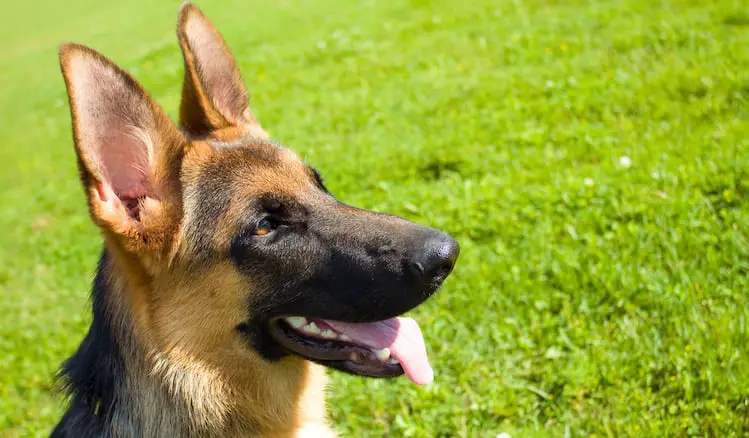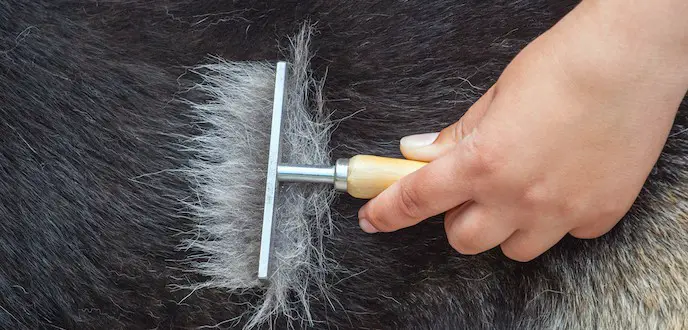Do German Shepherds Shed?
(And how to minimize shedding)
Last Updated By Matt Clayton 5 Weeks Ago
German Shepherd, also known as GSD, is one of the most popular dog breeds in the U.S., which makes sense as they are loyal, obedient, and courageous dogs. Many people love this beautiful breed and consider adopting one into their family.
We often think of pets as cuddly and furry little creatures who bring joy to our lives.
But they require a lot of care, and other breeds are more high-maintenance than others. For this reason, you may be asking do German Shepherds shed?
Before adding a GSD to your family, you need to know what you're getting into.
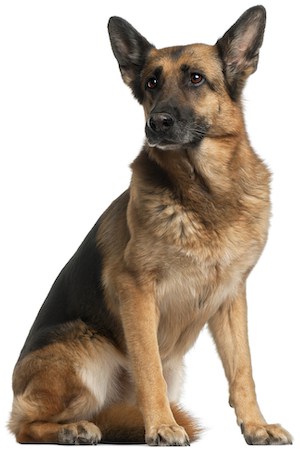
Seasons
The season will have an impact on how your pet sheds. You will find that your German Shepherd sheds year-round but expect to see more shedding during the spring and summer when your pet is letting go of his winter coat and gains his summer coat.
You will also find that after the summer, your GSD will start putting on his winter coat, which means losing the finer summertime hair. Again, you will see more shedding during this period.
In winter, shedding is reduced as your pet holds onto his coat as a means of keeping warm in cold temps. Furthermore, daylight plays a role too. As days get shorter, your dog's fur will respond accordingly, and less hair will be shed.
Losing the Puppy Hair
A German Shepherd puppy starts life with a thick and fluffy coat that keeps him warm and safe. Once these pups reach 4 to 6 months old, they begin growing their adult fur. As a result, owners will have to deal with more shedding.
Age
German Shepherds shed their entire life, but some pet owners have reported their dogs shedding even more as they get older.
Taking care to provide a good diet and regular brushing for your dog will help keep them looking great at any age.
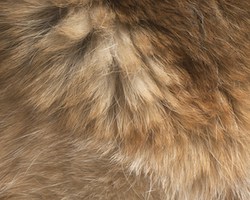
Nutrition
To promote a healthy coat, and keep shedding levels normal, feed your dog high-quality dog food. The first ingredient in any food you choose should be real meat, like poultry, beef, or fish.
You should make sure that protein comes first, followed by carbs, grains, fats, and veggies. Foods should also be abundant in omega-3 fatty acids, and healthy fats as these keep the coat of your German Shepherd shining.
Meanwhile, carbs and fats keep these dogs energized and playing.
Health
Your dog's health plays a big role in having a healthy and beautiful coat. For starters, feeding your pup a quality food and providing plenty of clean, fresh water plus the occasional treat will keep your dog feeling and looking great.
Secondly, regular visits to the vet and careful monitoring of your pet's daily behavior will keep you aware of how they are feeling and help you keep track of how their fur is growing.
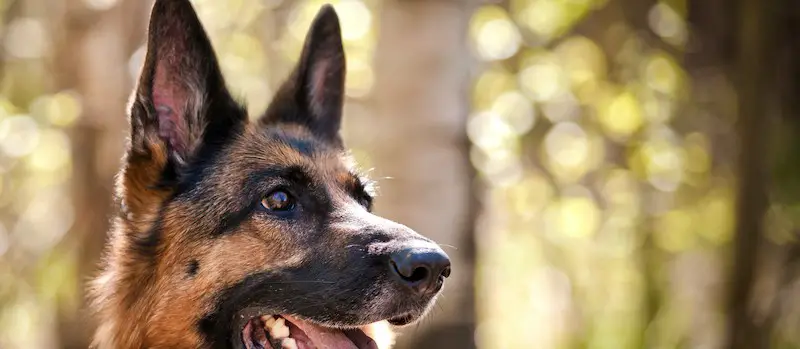
There are a few health conditions you should be aware of that can affect how your dog's hair grows.
1. Fungal/Bacterial Infections
Ringworm, fungal yeast infections, and pustules are all afflictions that can form on the skin and cause your dog pain. When it comes to ringworm, for example, dogs experience small infection areas and end up with itchy, red patches. This leads to bald spots where the dog scratches constantly. A vet can help by providing topical creams or medications and give you advice on treatment.
2. Mange
This is a term that encompasses all itchy skin infections that are the result of mites. Mites live on the skin or hair, and they burrow and chew on the skin of the dog. This leads to loss of hair and itching, and worst of all, humans may contract them (scabies, for instance, are contagious for both humans and canines).
Meanwhile, demodex mites are not contagious, but still do cause loss of hair. You will need to speak with a vet to get treatment. And lastly, fleas can make a dog lose hair thanks to their ability to make dogs itch incessantly. Most of the time, fleas can be treated with proper over-the-counter measures, but it is always encouraged to talk to a vet.
3. Other Medical Conditions
You may have noticed your dog losing hair in patches all over his body. If this is the case, your pet could be suffering from a skin condition or other medical issues such as hypothyroidism, growth hormone disorders, or disorders of the adrenal gland. Dogs have also been known to lose hair when suffering from cancer, kidney disease, or liver disease.
Baths
Bathing will always increase shedding because the massaging movement on your dog's coat will loosen all the dead hair that is about to fall out soon. Because you will see more hair falling out after the bath, it is always a good idea to deshed and brush your dog right after the bath (when the coat is completely dry).
Bathing should take place once a month, or as needed. Make sure to stick with quality pet shampoo. Spend a bit of extra money if necessary to ensure you are getting a shampoo that won't make your dog's hair fall out.
Make sure the shampoo is intended for dogs as human shampoo can leave dogs' skin feeling irritated and itchy. Dogs with sensitive skin can end up with flaky skin and increased hair loss.
Hormonal Cycles
Those of you with female German Shepherds may find that when your dog is "in season," she may become stressed out due to the hormones coursing through her body. This can lead to anxious or stressed behaviors, and hair loss can be a side effect.
Although our discussion centers upon shedding, these cyclical hormone changes and the stress it brings to your pet are one of many reasons to get your dog spayed.
2. Deshedding Once a Week
Deshedding a dog involves removing those loose undercoat hairs using a tool designed to do just that. This will help you get rid of the hair that might otherwise end up on the carpet, furniture, and clothes.
It helps your dog feel comfortable and can be a relaxing experience for you and your German Shepherd as well. The FURminator is a great tool, but be warned - lots of hair comes as a result of using this, so it may be useful to do this outdoors.
You should use a deshedding tool once a week to keep shedding under control. Also, you will get the best results by bathing your dog once a month and deshedding him before and after the bath. Remember to use a high-quality dog shampoo to prevent damage to the coat and stripping it from its natural oils.
3. Bathe Your German Shepherd Regularly
Brushing and deshedding your German Shepherd will reduce shedding considerably, but regularly bathing him will give you even better results.
When you bathe your dog, the massaging movement on the skin will help loosen up all the dead fur. This means that after a bath, you will see more loose fur being shed, and deshedding your GSD is recommended to keep that dog hair from being wafted around your home.
Regular baths combined with deshedding will definitely help you deal with pet hair and keep your home clean.
Bathe your dog once a month and use a mild dog shampoo that won't strip the coat from the natural oils that protect it. If bathing once a month will give your dog dry and itchy skin, try to use an even milder shampoo and bathe your pet less frequently.
4. Nutrition
The first line of defense in reducing shedding is a healthy diet. Meat is essential for German Shepherds as they are usually working dogs and need the extra protein. It also helps reduce shedding.
Add olive oil to their diet. Vets and trainers recommend a teaspoon of olive oil per five kilograms as it helps keep their skin moisturized as well. It will promote a healthier coat, which will reduce shedding.
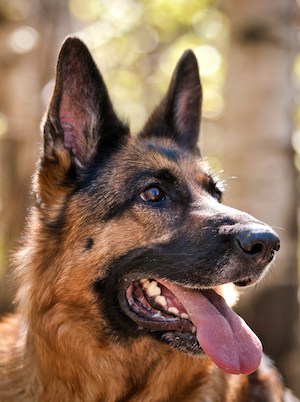
Adding some fish meat to their diet helps keep them free from excess dandruff as well. Be sure to debone the fish to avoid choking. Avoid corn and other grains in their diet. It is hard on their digestion, which can cause them to shed.
5. Clean Water
It may seem silly to discuss why dogs need water – after all, every living creature needs it. But making sure your canine has enough clean water to drink is part of good nutrition, which we have learned is important for good hair health.
Water carries and moves nutrients from your pet's food into and out of the body's cells. It helps food digest and helps the nutrients absorb into your dog's body.
Sure, your dog might be eating top-quality food with all the necessary nutrients, but what good is that if there is no clean water to drink? The nutrients in that food may not get where they need to go, resulting in a dull and unhealthy coat. The bottom line? Keep water available.
6. Prevent and Treat Skin Diseases
Allergic dermatitis, folliculitis, seborrhea, ringworm, mange, and acral lick granuloma are just a few of the skin diseases dogs may develop. Brush your dog every day and use that time to check him over for any irregularities.
Also, watch your dog go about his day – if he seems like he is not himself, or he is biting/licking himself constantly, it could be a skin disease that needs to be treated. Check your dog over and call the vet if you suspect something is off.
Regular visits to the vet for checkups to make sure your German Shepherd is free of fleas, ticks, and other parasites. Ensuring you keep their skin free of these annoyances will improve their overall skin health and decrease allergic reactions. And, it is also another way to help keep excessive shedding at bay.
Excessive Shedding
If your dog is shedding more than usual, take a look at his or her surroundings.
Factors such as a poor diet, a stressful environment, or even pregnancy can be the cause of excessive shedding in German Shepherds. If you suspect pregnancy, make sure to schedule a vet appointment to get her on the right path for a healthy pregnancy and litter.
Dogs should always visit their vet when owners notice excessive hair loss, as there may be a medical condition that needs to be treated.
Summing it up
Do German Shepherds shed? Yes, they do — a lot. However, there are many things you can do to control that shedding.
Although shedding is natural and there is no way of stopping your dog from shedding dead hair and growing in a new coat, there are ways to deal with shedding so that it won't drive you nuts.
- First of all, keep your dog healthy by feeding them nutritious, high-quality dog food. Check their skin and get any medical conditions treated.
- Secondly, brush your pet every day, use a deshedding tool once a week, and bathe him regularly. Grooming your dog will help you catch the loose fur before it is wafted into the air and spread around your home. And most importantly, it will keep your pet healthy and prevent excessive shedding.
- Thirdly, get an easy-to-use vacuum cleaner for pet hair and a carpet cleaner to help you keep your home clean.
To close, here are some key takeaways:
- Diet matters – feed your dog only proper food and provide unlimited clean water.
- Brush your German Shepherd every day
- Deshed your GSD once a week
- Bathe your dog once a month
- Monitor your dog daily to ensure they are not scratching excessively, as this could be the sign of a bigger problem.
In the end, if you're a dog lover and have your heart set on a German Shepherd, then go for it! However, it is important to understand that you will have much to keep up with in terms of vacuuming rugs, lint-rolling clothes, and, of course, brushing your pet.
Good luck, and enjoy your new dog!

